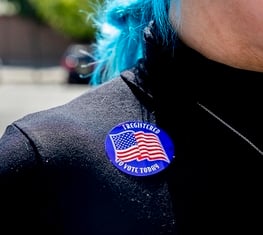Blog
In June 2022, the US Supreme Court ruled in Dobbs v. Jackson Women’s Health Organization, ending the federal constitutional right to abortion. This ruling eliminated a fundamental right that women and people who may become pregnant held for nearly fifty years and left the right to abortion up to federal and state legislation.
One year after Dobbs, 20 states are enforcing more limited abortion bans than before the ruling, including 14 states that have banned abortion at conception. Additionally, many have implemented other restrictions that make abortion less accessible.
Last year’s SCOTUS decision repealing the right to abortion continues to affect millions of people nationwide. Yet while most of us are familiar with its impact on family planning, I wonder if we all understand the full repercussions on every aspect of our lives?
In 2023, at least 322 bills restricting voting access were introduced in state legislatures nationwide.
Though many of these restrictions may appear simple and easy to comply with, they often have a huge impact on voters with disabilities, people of color, indigenous communities, students, young voters, and older adults. Four common voting restrictions — third-party ballot drop-off restrictions, early voting restrictions, ballot drop-box restrictions, and strict absentee ballot requirements — are particularly devastating.
In the past couple of years, we have seen unprecedented numbers of legislative attacks on the rights of lesbian, gay, bisexual, transgender, queer, intersex, asexual, and other sexual and gender minority (LGBTQIA+) individuals, particularly transgender (trans) and non-binary youth. These attacks, accompanied and “justified” by false and pathologizing narratives about LGBTQIA+ people, have devastating consequences for the community’s physical and psychological well-being.
How much do you know about our democracy’s Founding Mothers from the eighteenth century to today?
LWV Press Secretary Shannon Augustus shares her experience registering high school voters with Virginia League members.
Ten years ago, the Voting Rights Act's power to prevent election discrimination was undermined by the Supreme Court decision in Shelby County v. Holder.
The ruling's impact is still felt, as some politicians attempt to limit the electoral power of specific communities, such as Black and brown voters.
One year ago today, the Supreme Court of the US took away our right to bodily autonomy.
LWV President Dr. Deborah Turner launches her three-part blog series about the impact of Dobbs and other anti-abortion legislation with a look at the medical impact of anti-abortion laws.
Juneteenth is the oldest nationally celebrated commemoration of the ending of slavery in the United States, and just one of several “Emancipation Days” observed by Black diasporic communities in the Caribbean, Mexico, Canada, and the U.S.
The United Nations' Commission on the Status of Women (CSW) is the principal global intergovernmental body exclusively dedicated to the promotion of gender equality and the empowerment of women. The CSW is instrumental in promoting women's rights, documenting the reality of women's lives throughout the world, and shaping global standards on gender equality and the empowerment of women.
Sign Up For Email
Keep up with the League. Receive emails to your inbox!
Donate to support our work
to empower voters and defend democracy.




